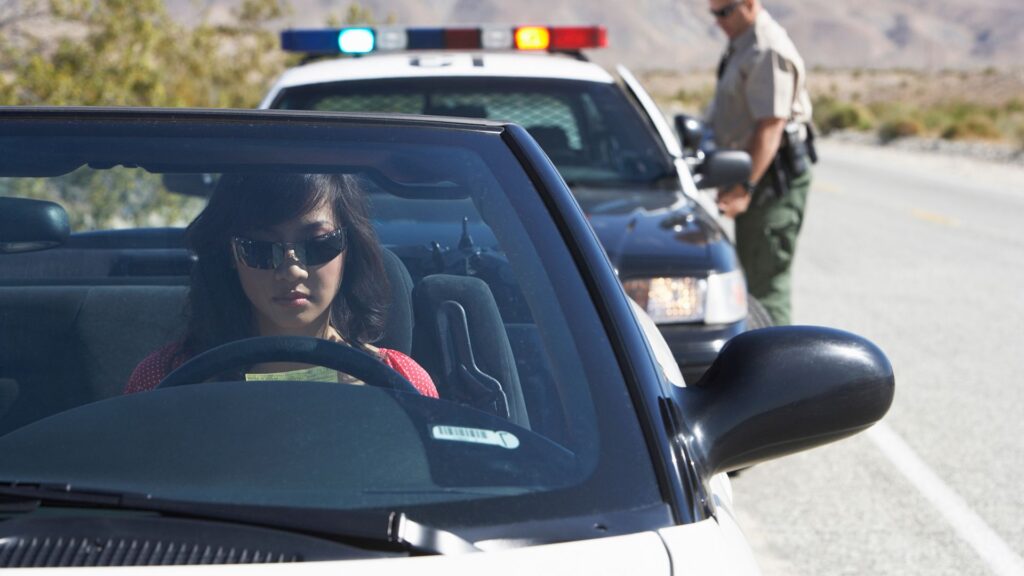It is likely that at some point in your driving career you will be pulled over by law enforcement. That feeling of anxiety can overtake you when you realize the lights and the sirens are coming for you. You may wonder, “What are my rights during a traffic stop?”. Attorney Scott McClintock has some advice for you if you get pulled over. Here are 5 things you should do if you are pulled over while driving.
Pull Over Safely
You’ve just driven by a police officer and you think you were within the speed limits but he or she flashes the lights and sirens indicating they are coming for you. When this happens you should safely, but swiftly, pull over to the right side of the road. If you are on the highway, pull over as far right as you feel safe. If for some reason you feel unsafe by the car pursuing you, perhaps it is an unmarked car, you can choose to call 9-1-1 and notify the operator that you are being flagged to pull over and tell them that you intend to do so in a populated or well-lit area.
Prepare Your Documents
It is likely that when the officer approaches your window he will ask you to present your driver’s license, insurance card, and registration information. It is important for every driver to know where these documents are located in the vehicle prior to driving. It can be very intimidating when the officer is demanding documents and you are not sure where they are, or if they are up-to-date.
When rummaging around in your vehicle, it is important to keep your hands visible. The officer will be watching your movements very closely. You do not want to appear suspicious. Keep your hands visible, move slowly, and if you have to reach for your documents you can announce, “I am going to reach under my seat”, for example.
Should You Answer the Question, “Do You Know Why I Pulled You Over?”?
Many drivers report that the first question an officer asks is “Do you know how fast you were going?” or “Do you know why you were pulled over?”. Be cautious of this question. This is a tactic for the officer to entice you to admit to doing something wrong. In Illinois, you are not required to admit to anything other than your name if an officer engages you in conversation. If during the traffic stop you are put under arrest, anything that you say, even from the very first question can be used against you. If you are asked these types of questions it is safe to answer, “No”. You cannot assume to know the reason the officer has pulled you over.
How To Talk To a Police Officer
How you choose to respond to the officer can also help you. Aggressiveness or a bad attitude can escalate the encounter. Try to remain polite when addressing law enforcement and speak clearly. Wisecracks, jokes, or bribes are not funny and can aggravate the scenario causing the officer to become suspicious. Even if you are instructed to exit the vehicle and stand against the car it would be in your best interest to comply and avoid any attitude or appearance of resisting arrest.
Can Police Search My Car?
If an officer becomes suspicious of you or has reason to believe there may be something unlawful located in your vehicle, you may be asked if the officer can look around. You do not have to agree to a search. In fact, in most cases, an officer must acquire a warrant before he or she can search your car or any of your property. Avoid giving permission for a search but remain clear and polite.
Wouldn’t it be a relief if you were to be released with a warning during a traffic stop? Unfortunately, that is not always the case. If you still do not know what to do if you are asked to take a field sobriety test, make sure you follow our blog articles to keep getting tips on what to do if you are accused of drinking and driving.
The Top Rated Defense Attorney Near Me
Scott hopes these tips on how to handle a traffic incident are helpful. If you find yourself in a situation where you need a top-rated defense attorney, contact McClintock Law. Attorney Scott McClintock is the best lawyer in Warren County and surrounding areas because he believes one mistake should not define your future. Whenever you’re in a tight spot, get Scott.
To schedule a free consultation call our firm at (309) 715-7181 or contact us online at www.scottmcclintocklaw.com to talk about the best outcomes for your legal problems.





